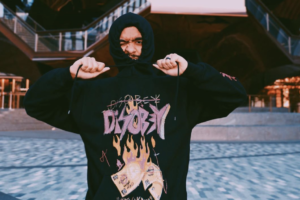Inside Information | Managing Artists, Setting Up Shows, Developing Artists Relations by Nick Jorgenson
I started managing artists completely by accident. It was never some life long dream of mine or anything like that. I began working as a software developer in 2015 after college and realized that I didn’t exactly love the 9-5 cubicle lifestyle. I felt like I was supposed to be doing something bigger and I always had a passion for music (especially hip hop). I was even writing my own raps since about 2011 – but I was by no means good. So my passion mainly manifested itself mainly in the form of my Spotify playlist “Lifting Heavy Ass Weights”. It was my personal gym playlist comprised of hip hop music that I really liked. Apparently, other people shared my taste and began following my playlist. I never really noticed or thought much of it, though.In November 2016, I had accumulated about 5,000 followers and began to realize that meant something due to the sheer amount of contact I received. At this time, the term “playlisters” wasn’t really a thing yet and people were just starting to understand the power of Spotify and playlists. I was getting a few messages a day from artists, music companies, etc. including a couple of offers to buy it from me. I remember sitting in yoga class waiting for it to begin with my friend George when I got an offer of $100. George called me an idiot for turning it down and that’s still one of my favorite stories.The playlist continued to grow and in March of 2017, I was first contacted by Oren Major. He sent me a message on Facebook the same way everyone else did, but with a bit more tact. I did not reply. He then followed up about a week later, and this time I responded. I listened to the songs he sent me for my playlist and didn’t think they were a good fit. But I really liked his sound, his lyrics, and the quality of his music. I proceeded to listen to everything he had on every platform, and decided that he had more talent than most of the current mainstream artists, and he only had about 27 monthly listeners. We chopped it up a bit and began a friendship. I determined that “Spice” (which was not one of the songs he sent me) was the best fit for the playlist and probably his catchiest song at the time. I added it, and slowly it began to improve his streaming numbers. I continued to help him purely out of the love of the music and went on to get him an interview with an overseas music blog and a placement for his music video on a popular Facebook Hip Hop page. When asked by another artist I was talking to how I knew Oren, I realized I didn’t know what to say other than “he’s my friend”. I sent that conversation over to Oren and he replied jokingly “I’ve been telling you to just say you’re my manager”.– Now at this point in my life, my internal response was “what the fuck is a manager”. I had no idea what artist management meant and barely even knew it was a thing. I knew almost nothing about the music industry. I was just a regular guy, working a 9-5. –My response to Oren was, “Then I think we need to have serious conversation about how we want to move forward.” We had our first phone call, and after that I got to work. I found an entertainment lawyer, formed an LLC, drafted a management agreement, negotiated it with Oren for several weeks, and then finally signed Oren as my first artist on July 19, 2017.What are some of the challenges you face managing Oren?
I think the biggest challenge with managing Oren is the distance. He lives in Atlanta and I live in Arizona, so it’s essentially been a long distance relationship since we began working together. Not having the ability to have an actual conversation can be tough, and FaceTime is usually what we have to rely on. Communication is extremely important for all relationships. I feel like it’s impossible to communicate too much information, especially when it comes to business. I can’t do my job if I don’t know exactly what’s going on at all times. This doesn’t mean we check in with each other every fifteen minutes or anything like that, but we tend to talk almost everyday depending on what’s going on. Whenever a new opportunity or something comes along, I’ll pursue it, but I’ll also tell Oren about it right away and get his feedback and interest level. He does the same thing. Without this level of communication, we would have not accomplished nearly as much as we have. However, this was definitely a learned skill. It took several months to get him used to communicating with someone as much as we do. He doesn’t really talk to people that much in general, so to have to communicate so much with someone new was a challenge. And on my side, I had to become okay with feeling like I was being annoying. I would say to myself “I don’t give a fuck if I’m annoying him. I need him to have this information/I need this information, for us to be successful.” Getting over myself and that feeling was tough. But now obviously, communication between us is almost second nature.
Up until recently, Oren was also unable to travel freely due to legal issues. Thankfully that is no longer the case, but during that time it made doing shows/tours almost impossible. And now the current challenge is learning how to route tours since we never even had that as an option before. But the upside to his travel restriction was that it forced us to adapt and focus on what we could do. That’s one of the main reasons we worked so heavily on the digital streaming and social media presence. We had to find a way to reach fans and listeners without him actually traveling and meeting people.
Other than that, though, he’s a pleasure to work with. He is extremely humble, down to earth, and coachable. He doesn’t have a big ego to get in his way and he rarely gets upset or flustered. He’s consistent. And he’s one of the hardest workers I’ve ever met. I told myself and continue to tell others that based on what I know about him and what I see, “He’s gonna make it with or without me.” If he wasn’t these things, I probably would have quit a long time ago.
Do you have any mentors you can seek for help in the same field?
I have never really had a mentor. I know I should, and I know it’s helped a lot of people become successful. Especially with my lack of experience and exposure to the industry I’m trying to work in. But for me, it just never really happened. And I’m also not the type of person to try and force relationships. I would say that there are other managers that I look up to, though. Shelton Harris is a great one, and I’ve watched his success since I first talked with him when he was deciding to transition from being an artist into management. I thought he was crazy haha. Of course there are other legends like Ib from J. Cole/Dreamville. I read his interview several times and still quote it and use it as advice I give to others. “A manager is someone who is willing to run through a wall for you.”
The only relationship I can think of that is similar to mentorship is the one I have with Amond Jackson. Amond “AJ on the buttons” is a legendary audio engineer with credits from almost everyone you can think of. I still remember meeting him for the first time, walking into his studio, seeing the new Rick Ross CD sitting on his desk and him telling me “Oh yeah, I did one of those tracks” like it was no big deal. I met Amond through a mutual friend Z Rich who was actually the artist that asked me how I knew Oren which sparked our first conversation about management. So I give him credit for that as well as introducing me to Amond which helped make my dream of a studio happen.
On November 15, 2017 I messaged Oren saying “I think when my lease is up in March I’m gonna get a house. Could have a studio”. I had never really wanted a house before that because I didn’t like the idea of a mortgage and being tied to some place. But I knew that having our own studio felt right. A place where Oren could create his music in peace and for free. On December 1, 2017 I contacted a realtor and began the house buying process. I made an offer on December 8 and closed on my current house on January 11, 2018. On January 13th, I went and visited the house for the first time with two of my friends and at one point during that night, I left and came back with a chunk of the carpet from the bedroom that would become the studio. Thus, began the studio process.
I continued tearing out the carpet, closet, walls, etc for a couple of weeks. One day, Z Rich replied to my Instagram story about it telling me to hit up Amond about studio design advice since Amond has built several studios including his own. The exact words he used were “I watched him build his from scratch. He’s a mad scientist”. I immediately contacted him since I had zero knowledge or experience in construction, much less studio construction.
Amond was happy that I reached out to him, and offered me a paid consultation over FaceTime to answer some questions and give me information. After that, I got to work. I bought a bunch of tools, did a lot more research, finished demolition of the bedroom and then spent the rest of 2018 building. Every once in a while, I would hit up Amond to ask questions, but he never charged me again. After the studio was finished, I thanked him immensely for all the help he gave me. And then in March of 2019, we finally met in person for the first time when I visited Atlanta for Oren’s first headline show at the Masquerade. I got to see his studio with Oren, and then the next morning he invited me to brunch and we talked about everything from handling the craziness of working in the music industry to social media strategies. I was so nervous. But being able to have a conversation with someone I had so much respect for energized me to continue down my own path.
Since then, we’ve met a few more times and I call him every once in a while when I’m having a dilemma. Most of those conversations, though, are related to the studio business/ Rap House, more than artist management. But his advice and wisdom always helps and I’m very grateful to have begun that friendship. He often talks about the way his relationships have formed over the years and he contributes much of his success to allowing organic relationships to happen. That’s probably the biggest lesson he’s taught me. That, and how to look out for yourself while being a nice guy in an industry that can be ruthless.
How would you advise somebody who wanted to get into managing artists? What is a good first step to take in the managerial direction?
Start with the artist. That person is going to be your partner on this, so you better pick wisely. I always tell people “Talent is just a prerequisite”. Here’s a few other things I look for:
- Drive and ambition – You can’t do anything with a lazy artist. And you can’t force them to be ambitious.
- Communication
- Financially responsible
- Doing it for the right reason
- Keeps their word
- Honest
- Willing to do the work
The last one is extremely important to me. There is nothing I do for Oren that he can’t do himself. I mean, he was doing it on his own before me. My goal as a manager, though, is to do everything I possibly can so that the only thing Oren has to worry about is making music. That’s the job.
I weed out the 90% of messages and opportunities that fall through. I determine who’s serious about working with him so that he doesn’t have to. A lot of the work isn’t glamorous or fun. It’s tediously registering each song in every database. It’s writing up the lyrics to every song and uploading them to genius. It’s organizing files and beat licenses. It’s being the guy at the release party who’s missing everything running around picking up spilt trash cans and finding the owners of cars that are about to be towed. It’s a lot of sacrifice. But it’s 100% worth it if it’s for the right person. So again, pick wisely.
Once you’ve found an artist that you believe in and would like to work with, literally just start. Start however you can. Do something. The reason Oren asked me to be his manager was because after knowing each other from Facebook for a couple weeks, I did things for him that people he had known his whole life never did. Not the Spotify playlist thing, but just reaching out to people and trying to get opportunities for him – the interview and music video post, etc. Show that you’re willing to work for this person. But don’t force the relationship. Don’t focus on the money or getting them to sign a contract. You have to be willing to work for free or almost nothing until they become successful anyways, so just see how you guys work together first. If it’s a good fit, then start the conversation about making things legal and legitimate and take it from there.
How do you go about setting up shows, tours, radio interviews for your artist?
I would say for all of these, having a good awareness is important. What I mean by that is having an understanding of the perceived value of your artist. This essentially comes down, in my mind, to three numbers.
- Spotify Monthly Listeners (and total streams and other platforms of course)
- Social Media Engagement (likes, views, and comments >> followers)
- Ticket Draw (in whichever location you’re trying to book)
There’s a lot more to “artist value” as I’ll call it, but these are the big three for me. I find it hard to focus on many different things, so I simplify it to this. And when giving advice to other artists and managers, I find it’s more helpful to have three very specific things to work on rather than a whole laundry list.
Once you’ve taken inventory of your big 3, you need to present them in the form of an EPK. I am by no means an expert in this, and I am currently working on a new one for Oren now. There are tons of examples online, so do some research and come up with one that works for you. For an EPK though, I do highly recommend adding any notable interesting accomplishments or facts you can think of. If you’re just starting out, you may not have any. We didn’t. But anything like:
- Big name features
- Spotify editorial playlist placements
- A Spotify official “This is …. ” playlist
- Your highest streamed song number (“Spice” – 1.5 Million streams, etc)
- Any radio play you’ve received
- Notable blog placements (Lyrical lemonade, etc)
- Anything that went viral
- Anything that makes your artist stand out or unique
For shows, Oren and I have been able to book most of them by reaching out to the booking manager or talent buyer. Look for shows on the calendar with bigger artists that match your genre and vibe. This will be your best bet for getting booked as well as gaining fans. Reach out with your EPK and ticket draw numbers. At the end of the day, it’s business. Like I said, talent is just a prerequisite, so if you have really good music but can’t sell any tickets, don’t expect to get booked over someone who can. And if you do manage to book a show, do whatever it takes to sell tickets. And more importantly, get bodies in that building. This may mean giving out free tickets to anyone willing to come and support and taking a loss on the ticket sales. This is in my opinion much better than taking a loss on the number of people who show up and never getting booked by that venue again. So do whatever it takes to sell those tickets. Annoy everyone. Don’t expect people to get excited and volunteer.
I had to sell fifty tickets for Oren opening for Snow Tha Product last year for his first show in Arizona. That meant that nobody here knew who he was and I had to sell fifty tickets at $22 a piece in less than a month. Not an easy task. Luckily, Snow being an amazing artist helped, but I still had to put in a lot of work. What it mostly came down to was finding the Facebook event page and friend requesting/messaging every single person who liked or commented anything on that page. I probably sent over a thousand messages. And then I waited and prayed that these people not only checked their message request inbox, but would respond, hadn’t already bought tickets, and would meet up and buy them from a stranger. But I got it done and his first Arizona show was a huge success.
This brings me to another good way to potentially book a show. Oren’s relationship with the booking manager at the Masquerade in Atlanta helped him to book an opening slot for Snow Tha Product prior to the Arizona show. Because of that, I was able to reach out to Snow’s team (by googling) and ask if he could open for her again in Arizona. It took tons of following up, but we were able to have Snow’s team request him as an opener for the Arizona show without ever contacting the venue directly. So if you’ve ever opened for someone, try reaching out the next time they have a show. They might help you out.
As I mentioned before, we’re still learning about tours as we route our very first one. But one of the resources we are trying out is Indie on the Move. It was recommended to us by a booking manager and they seem to make booking in general easier. Give it a shot if that’s something you’re interested in and I’ll update this later after we’ve done our first tour.
For booking radio shows or anything else that’s similar, there are tons of ways. But I always suggest starting by starting. Keep it simple. If you’d like to get booked on a radio show, google it and find out how to get in touch. Once you talk to them, find out their requirements and what they need. And if you don’t get booked, don’t take it personally. Just keep working.
Where do you go to build your knowledge? Any specific books?
There’s only two book resources I can recommend. I’m honestly not much of a reader. But “Practicing the Power of Now” has been pretty life changing for me. I hate that way entire sentence sounds, but it’s true. I have a lot of anxiety sometimes with all of the shit I’m juggling and this book really helped me to focus on the present moment and the things I can control. Your list may not look mine, but it’s probably similar:
- My full time day job
- Managing Oren and Doneze
- Physical and Mental health
- Building/ running my studio
- Running my playlist
- Making my own music
- Writing these guides
- Helping others/ My Instagram
- House and car maintenance
- Budgeting/money
- Family
- Relationships
The other book I read recently was “The Alchemist”. I don’t believe it’s going to change who you are as a person necessarily, but it always made me feel calm when I read it. And it definitely did inspire me.
Are there any tips or tricks you use when evaluating a legit opportunity?
Intuition. Looking for red flags. This is a pretty broad question, but in general, you learn over time how to not be dumb. If you’re still one of the people who freaks out every time you get a spam email saying “We found your talent and want to sign you”, there may not be anything I can do to help you. Other than to say, don’t send them money.
As far as actual opportunities, it usually comes down to talking with Oren and discussing the details. In my experience, 95% of all things in the music industry fall through. Everything. And a lot of it is just because everyone is busy. Things don’t just fall through cracks, it feels like this industry is built on the cracks. And what you see remaining is that 5% of things that actually happened. So never take it personally when something doesn’t happen and don’t get discouraged. Just look for the next thing.
If it sounds to good to be true, it probably is. You’re not gonna get signed off of an instagram video teaser for your new single with 136 views. It’s just not gonna happen. So if it doesn’t make sense that a label is reaching out to you, they probably aren’t. However, if another small artist messages you saying they listened to your video and think you’re dope, that’s definitely possible! And I highly recommend working with that person if that wasn’t an automatically generated message. If you think their music sounds good too, and they actually have a song ready for you to get on, then that’s a good opportunity.
One of my first strategies when working with Oren actually revolved around doing as many collaborations as possible. I figured that if Oren has 50 listeners, and Artist B has 50 listeners, then putting Oren on a song that Artist B releases gives him the chance at gaining 50 new fans. Especially when Oren bodies every verse. So if you’re just starting out and don’t have a budget or anything like us, start there. Find other people at a similar level to work with. If they ask you for money and don’t see the bigger picture, then just move on. But targeting other artists’ fanbases is a good way to build your own.




